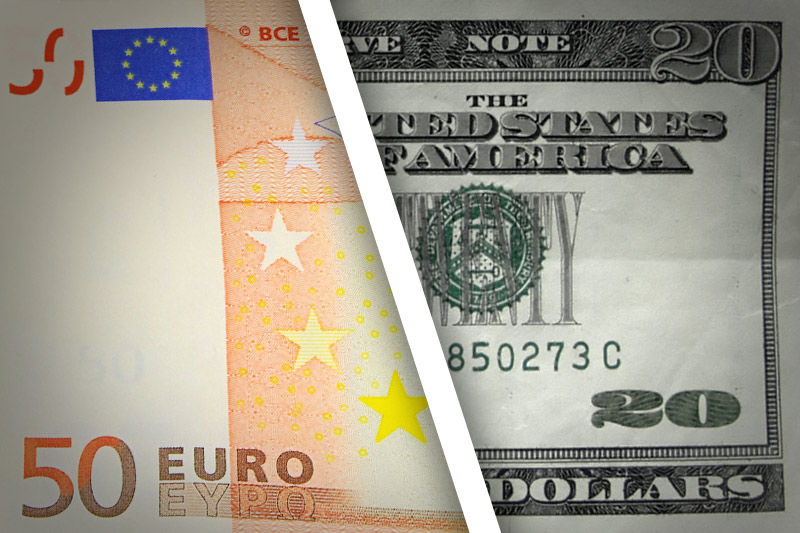Investing.com - The euro rose to session highs against the dollar on Monday, after Friday’s disappointing U.S. jobs report raised fresh doubts over a possible Federal Reserve decision to start tapering stimulus later this month.
EUR/USD hit 1.3220 during U.S. morning trade, the highest since Thursday; the pair subsequently consolidated at 1.3215, gaining 0.27%.
The pair was likely to find support at 1.3161, the session low and resistance at 1.3254, the high of August 30.
The Department of Labor said the U.S. economy added 169,000 jobs in August, fewer than the 180,000 forecast by economists and jobs growth for the two previous months was also revised lower.
The tepid data added to uncertainty over whether the Fed will start to unwind its USD85 billion-a-month asset purchase program at its upcoming policy meeting on September 17-18.
Risk appetite was boosted as improved trade data out of China over the weekend added to indications that the world’s second largest economy is recovering from a slowdown.
Data on Sunday showed that Chinese exports were 7.2% higher year-over-year in August, up from 5.1% in July, and imports were up 7%.
In the euro zone, data on Monday showed that the Sentix index of investor confidence rose to a six month high of 6.5 in September, up from minus 4.9 last month. Analysts had forecast a reading of minus 2.8.
The euro’s gains were held in check after European Central Bank President Mario Draghi reiterated late last week that bank rates will stay at current or lower levels for "an extended period," despite recent signs of economic recovery in the euro zone.
Elsewhere, the single currency was lower against the pound, with EUR/GBP slipping 0.17% to 0.8418, but pushed higher against the yen, with EUR/JPY advancing 0.64% to 131.47.
Demand for the safe haven yen was hit following strong gains Japanese equities markets overnight after news that Tokyo won the bid to host the 2020 Olympics.
Japan’s Nikkei rallied amid expectations that spending and construction activity in preparation for the 2020 Olympic Games will further help boost Japan's economic recovery in the coming years.
Meanwhile, data released Monday showed that Japan’s economy expanded by 0.9% in the second quarter, bringing the annualized rate of growth to 3.8%, compared with a preliminary reading of 2.6%. The initial estimate for quarter on quarter growth was 0.6%.
EUR/USD hit 1.3220 during U.S. morning trade, the highest since Thursday; the pair subsequently consolidated at 1.3215, gaining 0.27%.
The pair was likely to find support at 1.3161, the session low and resistance at 1.3254, the high of August 30.
The Department of Labor said the U.S. economy added 169,000 jobs in August, fewer than the 180,000 forecast by economists and jobs growth for the two previous months was also revised lower.
The tepid data added to uncertainty over whether the Fed will start to unwind its USD85 billion-a-month asset purchase program at its upcoming policy meeting on September 17-18.
Risk appetite was boosted as improved trade data out of China over the weekend added to indications that the world’s second largest economy is recovering from a slowdown.
Data on Sunday showed that Chinese exports were 7.2% higher year-over-year in August, up from 5.1% in July, and imports were up 7%.
In the euro zone, data on Monday showed that the Sentix index of investor confidence rose to a six month high of 6.5 in September, up from minus 4.9 last month. Analysts had forecast a reading of minus 2.8.
The euro’s gains were held in check after European Central Bank President Mario Draghi reiterated late last week that bank rates will stay at current or lower levels for "an extended period," despite recent signs of economic recovery in the euro zone.
Elsewhere, the single currency was lower against the pound, with EUR/GBP slipping 0.17% to 0.8418, but pushed higher against the yen, with EUR/JPY advancing 0.64% to 131.47.
Demand for the safe haven yen was hit following strong gains Japanese equities markets overnight after news that Tokyo won the bid to host the 2020 Olympics.
Japan’s Nikkei rallied amid expectations that spending and construction activity in preparation for the 2020 Olympic Games will further help boost Japan's economic recovery in the coming years.
Meanwhile, data released Monday showed that Japan’s economy expanded by 0.9% in the second quarter, bringing the annualized rate of growth to 3.8%, compared with a preliminary reading of 2.6%. The initial estimate for quarter on quarter growth was 0.6%.
